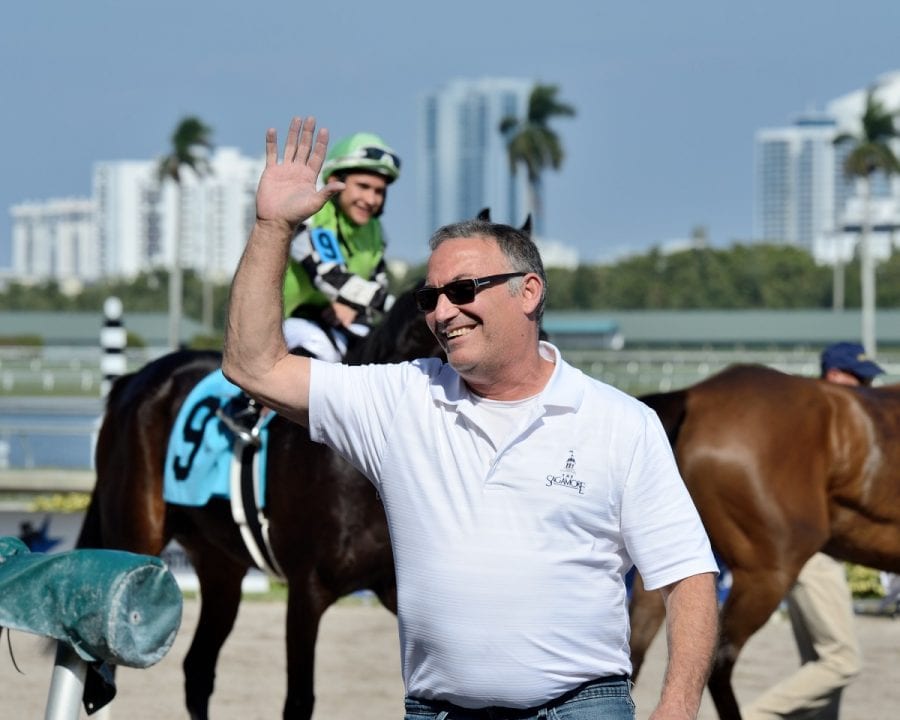Delaware Commission upholds one-year ban for Vitali

Marucs Vitali in happier times. Photo by Lauren King.
Barring an intervention from the court system, Marcus Vitali won’t be training horses again any time soon.
Following a hearing that went on for over four hours, the Delaware Thoroughbred Racing Commission on Wednesday voted unanimously to affirm its stewards’ July 22 decision to suspend Vitali for 365 days and fine him $2,500.
Vitali’s attorney, Alan Pincus, said afterwards that he and his client would “have to talk this over” before he would know if they would appeal. If he were to appeal, the next step would be into the state court system.
The case has been, in some respects, a comedy of errors, yet one with real consequences both for the participants and for the integrity of the game itself.
It arose in May when Delaware Park security was called to break up an altercation between two of Vitali’s employees. When security arrived, one of those employees, Brucie Garrett, asked they accompany her back to her dorm room because she wanted to give them something she was holding that she said she “wasn’t comfortable with.”
The two security officials, Mickaela Lee and supervisor Dan Panaro, did so. But when Garrett bent down to take the item — which she described as “a vial” but which Vitali said was a baggie with what appeared to be marijuana in it — from the vegetable compartment of her refrigerator, Vitali suddenly entered the room, grabbed the item, and left with it.
“All of a sudden, Marcus flew in between us all, grabbed it, pocketed it, and fled,” Garrett testified.
“It only took seconds, in and out,” Panaro added.
“I’m looking, they’re looking, nobody can see nothing,” Vitali testified. “I see what looks like weed in a baggie, I grabbed it.”
Vitali took the item back towards his barn at what Lee described as “a faster pace of walk.”
By the time the security officials caught up with him, Vitali said he no longer had the item, having disposed of it in a nearby trash can. Yet no one ever searched either the trash can or Vitali himself, leaving a conspicuous gray area in the case.
In Vitali’s telling, he’s the victim of his own good — if ill-considered — deed. He told the Commission that he grabbed the baggie to prevent the investigators from finding pot that Garrett had been storing for the employee with whom she had been fighting.
“I should have just let it go,” he lamented. “Let them take the thing, throw the kid out. Just too many drugs, too many things going on back here.”
But Garrett painted a different, and darker, picture of the Vitali operation. What’s more, she said, as a recovering drug addict, she would never store drugs for someone.
Garrett alleged that Vitali had bullied her into storing unmarked vials of a clear liquid that had not been identified to her. She said she had personally witnessed Vitali injecting a horse on race day with the liquid.
“I was told it was an anti-biotic,” she said. “I didn’t ask.”
Her testimony was in part supported by that of a veterinarian, Dr. Don Johnson, who said Vitali one day gave him an unmarked vial of the liquid and intimated he should administer it to one his horses.
“Whatever it was, it wasn’t an ethical substance,” Johnson said. “I wasn’t going to use it… It could be anything.”
He said that Vitali claimed it was a vitamin supplement — “I’d have to be skeptical,” Johnson said — and he told Garrett, via text message, that she should not store the vials for Vitali.
Vitali denied forcing his employee to store any vials and said that, when Garrett testified about his injecting a horse, she was lying “one hundred percent.”
Pincus’ strategy depended in part on underlining discrepancies in various testimonies. Both Johnson and Garrett, for example, testified to a similar event at which Vitali presented the veterinarian with a vial. But they differed as to what kind of a vial it was, with Johnson saying it had a screw-top cap and Garrett alleging it had the kind of top used for injectable medications.
And Pincus sought to portray Commission executive director John Wayne as the bad guy.
“Mr. Wayne, whose fingerprints are all over this, is not to be trusted,” Pincus told the Commission in his opening statement.
Pincus called Wayne’s decision to deny Vitali a stay of the ruling pending the outcome of this afternoon’s hearing “vindictive” and said it was “inappropriate” for Wayne to tell The Racing Biz that Vitali “is a breach of integrity.“
And he said that Wayne even approached Vitali in the paddock one afternoon and told him “he was going to get him.” That claim was not fully supported by testimony, however, with Vitali saying only that Wayne had told him “I’ll be watching you.”
All of that could, perhaps, have put investigators’ failures to search the garbage can or have Vitali empty his pockets — or even to prevent him from grabbing the item in the first place — in a more sinister light.
But Oliver Cleary, who as the deputy attorney general at the Delaware Department of Justice represented the stewards, pointed out that by interfering in an ongoing investigation and disposing of evidence germane to that investigation, Vitali had committed a felony under Delaware law.
“We probably should have called the state police at that point,” Vitali said.
“I agree,” said Cleary.
Cleary pointed out that Vitali has had numerous adverse rulings on medication issues over the years and told the Commission, in closing, that for most of the last couple of years, “Mr. Vitali has been suspended for his conduct.”
In the end, Pincus acknowledged the need for punishment but called the one-year term handed out “outrageous.” The denial of stay, Pincus said, had already caused his client to be “crucified financially.”
But Cleary differed.
“Even if I accept everything Mr. Vitali says is true,” he pointed out, “he has admitted to committing a… felony.”









What’s eating away at the thoroughbred industry?
By Jason Reed 43 years TB industry
Licensing! We license some of the worse people possible. They have no desire to become horsemen. They know very little about the horse and how to train one. Read the form. It’s all right there.
The test is ridiculous when you think about what is at stake. Horsemen are becoming a thing of the past. Any of us probably can point to less than a dozen. So very few trainers know that when horses reach 5 years old, they go through a mental change. They become adults, if you will. How many times have you seen an older horse get a freshening and expected to need one, romp with top speed numbers? Only to be run back in 21-28 days and watch the numbers digress, race after race. Now, the horse is mentally ruined because he told his trainer, the only way he knows how to communicate and got ignored. Now he starts a pattern of cheating. He gave up. Why? Because his trainer has no desire to become a horseman.
The fix: Anyone applying for a trainers license must take a horsemanship course, designed to teach about speed horses and stayers and the vast difference in training. Training the horses mind. Knowing how to get a horse ready for 2 turns without it being a big surprise. A course that also sets them on a path to horsemanship. I mark really nice horses to stable mail and watch 80% of them go right down hill due to shear ignorance. I’m SICK of it. Back in 1972, I remember full fields, all day. I also remember no shortage of true horsemen. As they died off, they left us with pretenders. They intern turned out more pretenders. It’s time to stop this destructive snowball and teach trainers how to train. Make testing far more intensive. Employ real horsemen to put together a course that works.
We agree 100% we would have liked taking those courses when first becoming licensed rather than having to learn these subjects the hard and slow way! We have seen many older horse ruined just as you say by unknowing horse people.